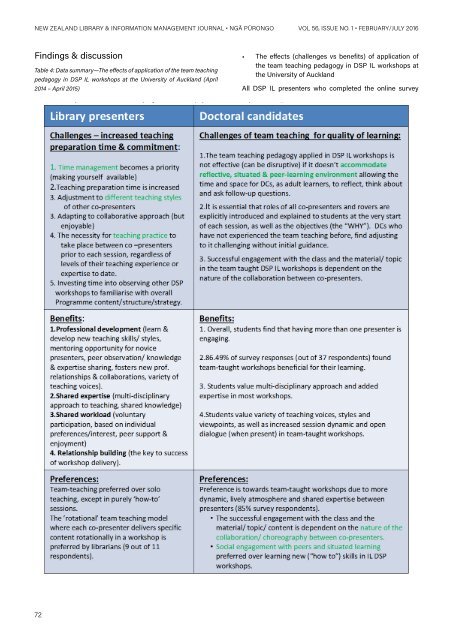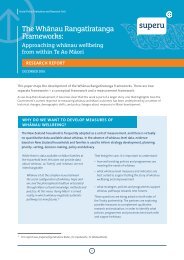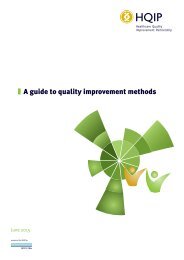THE NEW ZEALAND LIBRARY & INFORMATION MANAGEMENT JOURNAL NGĀ PŪRONGO
NZLIMJ%20FebJuly%202016
NZLIMJ%20FebJuly%202016
Create successful ePaper yourself
Turn your PDF publications into a flip-book with our unique Google optimized e-Paper software.
<strong>NEW</strong> <strong>ZEALAND</strong> <strong>LIBRARY</strong> & <strong>INFORMATION</strong> <strong>MANAGEMENT</strong> <strong>JOURNAL</strong> • <strong>NGĀ</strong> <strong>PŪRONGO</strong> VOL 56, ISSUE NO. 1 • FEBRUARY/JULY 2016 <strong>NEW</strong> <strong>ZEALAND</strong> <strong>LIBRARY</strong> & <strong>INFORMATION</strong> <strong>MANAGEMENT</strong> <strong>JOURNAL</strong> • <strong>NGĀ</strong> <strong>PŪRONGO</strong> VOL 56, ISSUE NO. 1 • FEBRUARY/JULY 2016<br />
Findings & discussion<br />
Findings<br />
The effects<br />
& discussion<br />
(challenges vs benefits) of application of the team teaching pedagogy in DSP IL<br />
workshops at the University of Auckland<br />
Table 4: Data summary—The effects of application of the team teaching<br />
pedagogy in DSP IL workshops at the University of Auckland (April<br />
2014 – April 2015)<br />
• The effects (challenges vs benefits) of application of<br />
the team teaching pedagogy in DSP IL workshops at<br />
the University of Auckland<br />
Table 4: Data summary—The effects of application of the team teaching pedagogy in DSP IL<br />
workshops at the University of Auckland (April 2014 – April 2015)<br />
All DSP IL presenters who completed the online survey<br />
8<br />
and those who participated in the focus group found the<br />
team teaching practice overall beneficial for their professional<br />
development and collaboration (see Table 4). These findings<br />
support the recommendations found in the literature (Wenger<br />
& Hornyak, 1999; Stehlik , 1995; Rytivaara & Kershner, 2012).<br />
Medaille & Shannon (2012) and Jurena & Daniels (1997) also<br />
highlight the importance of developing productive, positive<br />
and comfortable professional relationships among IL presenters<br />
as a key prerequisite of successful team teaching<br />
practice. From eleven Subject Librarians who responded<br />
to the online survey, two were completely new to team<br />
teaching practice as they never before had the opportunity to<br />
co-present, while three of the five presenters who took part<br />
in the focus group did not practice team teaching before they<br />
got involved in DSP IL workshop programme. For them, this<br />
was completely new teaching experience and one of them<br />
commented:<br />
It has changed my approach to teaching, because previously<br />
I only taught as a sole presenter, so it was interesting to start<br />
teaching as a team.” And another one pointed out: “I am a<br />
novice presenter, so I consider myself as “the younger” kind<br />
of presenter. And I look at my co-presenters as at “senior”<br />
level, and they are acting like my mentors.” “Every time you<br />
see someone else teaching, you learn…and also develop<br />
your own teaching style further. When I listen to other presenters,<br />
I always think:”Gosh, they’ve done it so well…I wish<br />
I could do the same, why can’t I do that, etc.”<br />
The presence of the variety of different teaching voices was<br />
also significant for most of the presenters in this study. The<br />
following comment illustrates this:<br />
It was great to combine two different styles of teaching, and<br />
presenting in different ways. I think the sharing and the dialogue<br />
between the presenters, and even the third person<br />
who is helping and roving, especially in a long class—it definitely<br />
feels that one person could be terribly boring talking<br />
for those two hours.<br />
The data also revealed that all presenters felt a strong commitment<br />
towards co-teaching preparation and pre-session<br />
communication, and understood that it was the key to the<br />
overall success of each workshop. However, not much of their<br />
attention was focussed towards actual pre-teaching trial run<br />
practice (‘choreography’) of the team teaching. For example,<br />
the online survey data showed that the DSP IL presenters’<br />
preferred practice (8 out of 11 respondents) was “pre-session<br />
meetings with co-presenter” and “mutual negotiation<br />
of team teaching approach”. The third placed preference was<br />
for “follow up communication” (6 out of 11 respondents) and<br />
end-of-semester meetings with workshop teaching teams to<br />
discuss pedagogical challenges and solutions. Only one presenter<br />
chose the actual “pre-teaching practice with co-presenter”<br />
as their preferred practice. However, the focus group<br />
conversations with students revealed that the nature of the<br />
collaboration and coherent, well-practiced ‘choreography’<br />
between co-presenters influenced significantly the quality of<br />
their learning in each session. One of them commented:<br />
I think that it really depends on the cooperation between<br />
the presenters. Like, when you can see that they’ve done it<br />
together many times—they were very fluent together, and<br />
I think it helps – they support and help each other in their<br />
teaching and it’s quite nice. But I think, when the interaction<br />
is not smooth between presenters, I feel a bit odd about it.<br />
When they have different opinions or one person is better at<br />
teaching than another, which happened in one of the workshops,<br />
then it’s like—“ah, nah, I’d rather just listen to this<br />
person than the other…because they know a bit more…”<br />
The data indicate that, with team teaching practice in<br />
place, the teaching team of IL presenters organically forms<br />
and behaves as a community of learners with its own specific<br />
needs. Most presenters’ comments from the focus group contain<br />
sequences such as: “I am learning…”, or “I have learnt a<br />
great deal from…” The development of the professional team<br />
dynamics, co-teaching relationships and teaching skills is<br />
enhanced by the grassroots formation of peer-learning partnerships.<br />
This can be compared to the findings of Hosier<br />
(2012), Pratt (2014), Eisen (2000a & 2000b) and Eisen &<br />
Tisdell’s (2001) research that highlight the benefits of using<br />
peer-learning partnerships that foster learning through joint<br />
reflection. Eisen (2000a & 2000b) differentiates these partnerships<br />
from the mainstream mentoring practice, where, as in<br />
this case, the individuals are contributing to the professional<br />
partnerships on equal terms and share comparable roles. The<br />
second group of learners with tendency and strong need to<br />
form a ‘community of practice’ identified in our study, is, the<br />
group of DCs attending DSP IL workshops.<br />
The focus group conversation with DCs revealed that,<br />
regardless of the type of content introduced (skills-based<br />
‘how to’ vs topical ‘what is/why’), when situated learning<br />
environment and peer-learning methodology are not fostered<br />
and opportunities for knowledge sharing and (if conditions<br />
allow) peer-teaching are not provided, the level of engagement<br />
among DCs in DSP IL workshops is lesser and the<br />
added value of team teaching pedagogy almost irrelevant.<br />
One example from the DCs focus group discussion is:<br />
After one of the sessions I remember coming away and<br />
thinking: “Well I wish I could have had some time talking to<br />
the people around me, because they would have been able<br />
to put things in different ways that presenters did, that might<br />
have made a better sense to me. And I went out of my way<br />
to talk to the people beside me, and each time we’d make a<br />
little conversation like “How are you going with this and that,<br />
etc…?” I really like that, but it wasn’t encouraged.<br />
To delve further into the learning new skills vs peer-learning<br />
dichotomy, the principal researcher asked DCs the following<br />
sub-questions during our focus group discussion:<br />
• How important is it for you, as doctoral candidates,<br />
when you attend the skills-based workshop, to feel a<br />
part of the group (group of learners) in a classroom,<br />
and to connect with other colleagues in the class, and<br />
have the chance to talk to them?<br />
• How much does that matter in terms of your learning<br />
compared to following the ‘how to’ activity in order to<br />
try out new functionality or learn how to use a particular<br />
tool or software?<br />
The feedback we have received from students confirmed<br />
the notion that the team teaching pedagogy applied in DSP<br />
IL workshops is not effective if it does not accommodate a<br />
reflective, peer-learning environment allowing the time and<br />
space for DCs, as adult learners, to collaborate and learn from<br />
72 73






